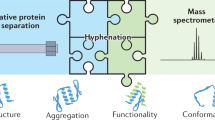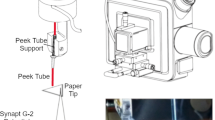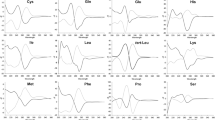Abstract
THE separation of mixtures of amino-acids into discrete spots on paper chromatograms has hitherto almost invariably been carried out using solvents only partially miscible with water. However, in work concerned with the separation of certain peptides we found that the usual solvents (namely, butanol, benzyl alcohol, phenol, collidine) were inadequate, and in consequence sought alternative solvents.
This is a preview of subscription content, access via your institution
Access options
Subscribe to this journal
Receive 51 print issues and online access
$199.00 per year
only $3.90 per issue
Buy this article
- Purchase on Springer Link
- Instant access to full article PDF
Prices may be subject to local taxes which are calculated during checkout
Similar content being viewed by others
References
Consden, R., Gordon, A. H., and Martin, A. J. P., Biochem. J., 38, 224 (1944).
Wilson, W. C., “Organic Syntheses", Collective vol. 1, 279 (John Wiley and Sons, Inc., New York).
Author information
Authors and Affiliations
Rights and permissions
About this article
Cite this article
BENTLEY, H., WHITEHEAD, J. Use of Furan Derivatives in Paper Chromatography. Nature 164, 182–183 (1949). https://doi.org/10.1038/164182a0
Issue Date:
DOI: https://doi.org/10.1038/164182a0
This article is cited by
Comments
By submitting a comment you agree to abide by our Terms and Community Guidelines. If you find something abusive or that does not comply with our terms or guidelines please flag it as inappropriate.



